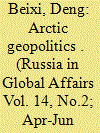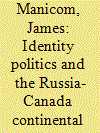| Srl | Item |
| 1 |
ID:
146271


|
|
|
|
|
| Summary/Abstract |
In the post-Cold War era the countries bordering the Arctic have not secured a framework security treaty for operations in that extreme northern region. While attempting not to miss the considerable potential economic advantages, the Arctic nations have been careful to maintain a well-functioning cooperation mechanism and ensure favorable conditions for developing and investing in the region. However, the existing mechanism has failed to prevent negative global trends from affecting the region. The sanctions imposed by the United States and the European Union on investment and the transfer of technologies to Russian oil and gas companies engaged in mineral prospecting and extraction have created a spirit of rivalry in the Arctic between the East and the West.
|
|
|
|
|
|
|
|
|
|
|
|
|
|
|
|
| 2 |
ID:
121434


|
|
|
|
|
| Publication |
2013.
|
| Summary/Abstract |
The geopolitics of the Arctic region is viewed as a race for resources between coastal states. Yet, alarmist assessments are tempered by the reality that the most economically viable hydrocarbon reserves are entirely contained within the uncontested EEZs of the littoral states. Given this situation, confrontational rhetoric coming from Ottawa and Moscow seems not only troubling but peculiar. This article attempts to explain this peculiarity. It argues that leaders in both states seem willing to emphasise the ideational salience of disputed space to domestic audiences while downplaying their cooperative track record. The article finds mixed evidence of the instrumental use of national identity politics in Arctic issues, which often conflate distinct elements of Arctic geopolitics. While this dynamic has not yet prevented cooperation over disputed boundaries, perpetuation of these narratives may erode domestic support for dispute settlement.
|
|
|
|
|
|
|
|
|
|
|
|
|
|
|
|
| 3 |
ID:
177729


|
|
|
|
|
| Summary/Abstract |
This paper presents an analysis of Finland’s Arctic strategy, providing a perspective on contemporary ‘Arctic geopolitics’ outside the dominant emphasis on the territorial politics of the Arctic Ocean coastal states. Concurrently, this serves as an empirical framework for interpreting the contextual de- and re-territorialising manifestations of geopolitical state strategies that are increasingly about securing competitive advantages, rather than exerting or extending territorial control over resources. By deploying the notion of anticipatory geographies this paper shows that Finland’s Arctic strategy documents have produced two intertwined promotional visions that are predicated on the discourses of international competitiveness and which relate Finland to the Arctic region. These are 1) Finland as a key provider of solutions to problems in Arctic development and 2) Finland as an attractive territorial node in ‘Arctic flows’. These anticipatory geographies are facilitated in practice through the political consolidation of ‘Arctic’ markets for Finnish exports and through infrastructure projects purportedly enhancing the position of Finland within various ‘economic flows’. Together, these notions illuminate the geopolitical dimension of attempts to secure competitive advantages and how this relates to the processes of state spatial transformation through de- and re-territorialisation, especially beyond the recently much emphasised context of city-regionalism.
|
|
|
|
|
|
|
|
|
|
|
|
|
|
|
|
| 4 |
ID:
126101


|
|
|
|
|
| Publication |
2013.
|
| Summary/Abstract |
It was the privately-sponsored Russian expedition to the North Pole in August 2007 that opened a new competitive era in Arctic geopolitics, and the technologically elegant PR-trick with planting the flag into the crisscross point of meridians on the depth of 4,261 m produced a resonance that distorted strategic thinking about, and political interactions in the Arctic region. Six years later, the dust of over-excited forecasts of unregulated confrontation across the Northern frontier has mostly settled down and the atmosphere of cooperation has become prevalent, but Russian Arctic policy is in new disarray. With its large population centres (like Murmansk or Norilsk) beyond the Polar circle and huge resource-extraction industry, Russia is objectively the Arctic superpower, and the high concentration of strategic forces on the Kola Peninsula adds a heavy military dimension to this status, but Moscow is nervous about protecting its interests against encroachments of ambiguous neighbours and ambitious newcomers. 1 The discourse of 'conquering' and 'owning' the High North is organic to the Russian state identity, incoherent as it is, and is often exploited as political expediency dictates, which increases the sensitivity of public opinion to setbacks and accidents that tend to bedevil many Arctic projects. There is a rich tradition of exploring and developing the vast inhospitable territories and seas, but the attention to environmental issues and to the rights of indigenous peoples is strikingly low. This article focuses on the crucial importance of issues pertaining to sovereignty in Russian policy-making, while starting with examining the revised evaluations of Arctic resources and continuing with assessing the usefulness of military build-up.
|
|
|
|
|
|
|
|
|
|
|
|
|
|
|
|